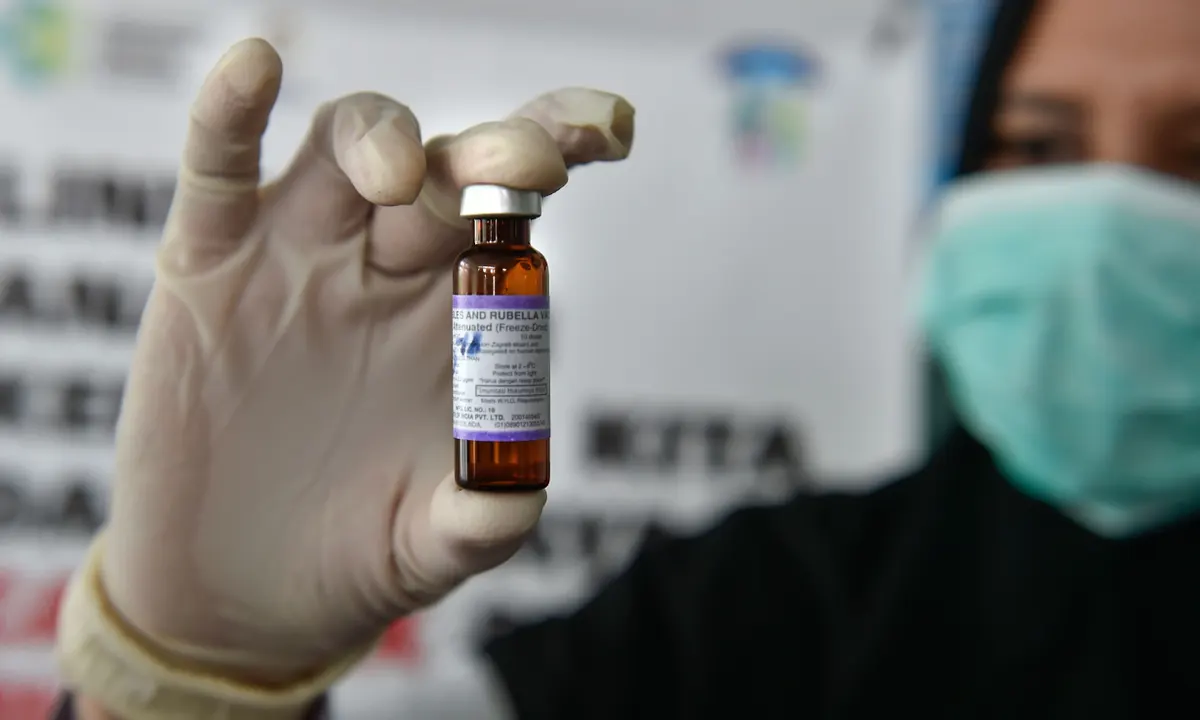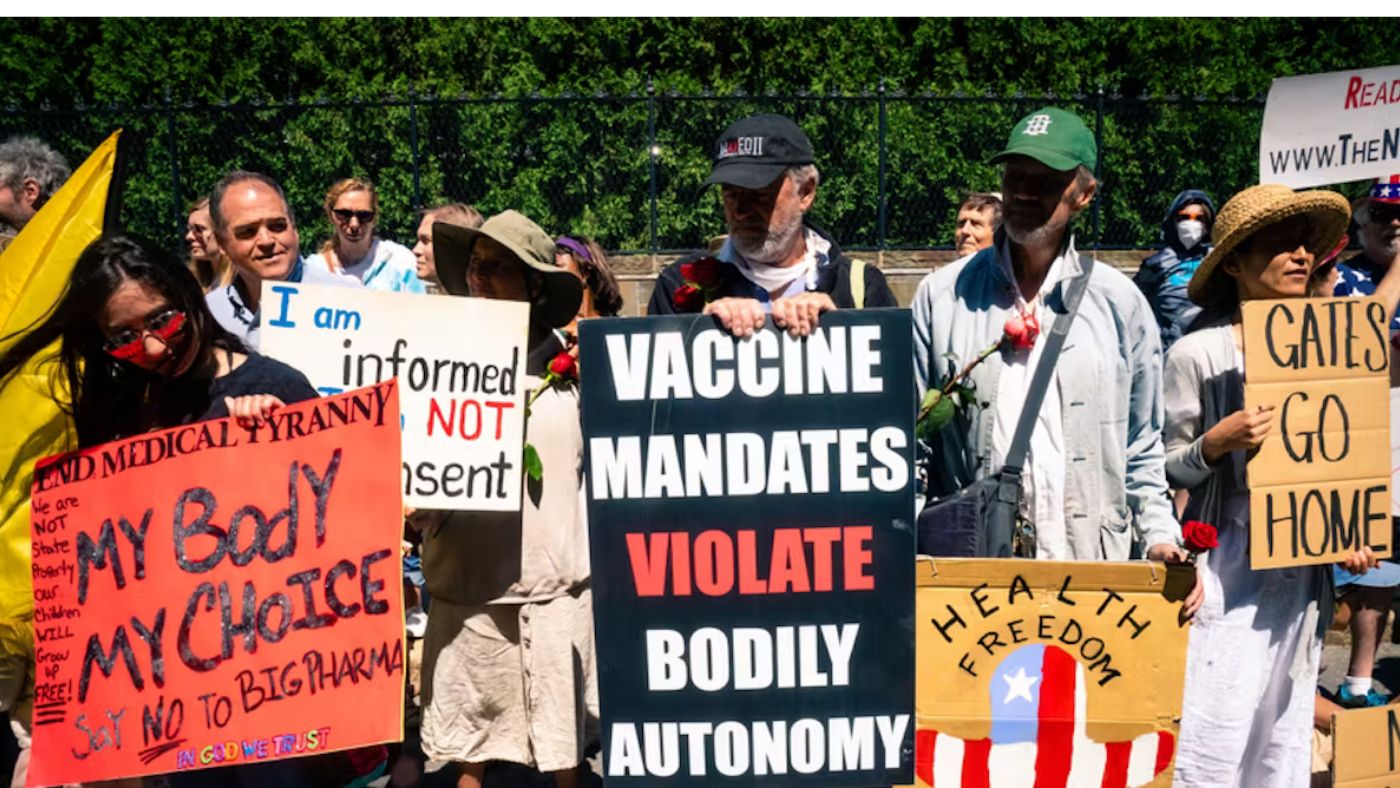In a Facebook group for parents, a mother seeks advice amid a recent increase in measles cases.
She received a letter from the NHS urging her to vaccinate her young daughter with the MMR vaccine, which guards against measles, mumps, and rubella, emphasizing its crucial importance.
However, she expresses uncertainty about where to find trustworthy information. “I’ve done some research but feel like a lot of the info on the web is pro-vaccine,” she writes.
Another mother shares similar concerns, deliberating over whether to proceed with childhood vaccinations and seeking guidance on which ones pose acceptable risks. “Just trying to learn about it all and make the right decisions. Thank you in advance,” she adds.
Responses flood in within minutes, largely echoing the same advice.
“No no no. Avoid them all,” one person asserts. “Once they’re injected into the bloodstream, the metals and toxins have access to the brain and every organ!” she falsely claims. “Arm yourself with information to decline because they will pressure you.”
Others recount stories of children allegedly harmed by the MMR vaccine and advise disregarding NHS communications.
“I keep getting letters for all my kids. It’s scaremongering. I’ve threatened my surgery with harassment if they don’t stop sending me letters,” another member comments.
The influx of anti-vaccine sentiments appears to influence both mothers. Grateful for the support, the mother who received the NHS letter decides firmly against vaccinating her daughter. “I definitely won’t be letting her have it,” she concludes.
These discussions are unsurprising in a Facebook group focused on wellness and holistic health, yet misinformation about the MMR vaccine extends far beyond niche online communities.
Recently, articles from prominent outlets like Sky and ITV News warning of increased measles risks in the UK were met with laughing emojis and skeptical comments on social media.
Remarks such as “More fear porn,” “They want to jab the kids,” and “Fearmongering bullshit” underscored widespread distrust of mainstream media, health services, and the government.
“Rule of thumb, anything the MSM [mainstream media] push, you do the opposite,” one commenter asserted. Anti-immigration rhetoric also surfaced regarding the rise in measles cases: “It’s coming from the small boat invasion,” one person speculated.
Simultaneously, influencers who gained prominence during the pandemic for spreading doubts about Covid vaccines have now shifted attention to the MMR vaccine.

Against a backdrop of declining childhood immunization rates, health experts express alarm over the resurgence of misinformation.
NHS data reveals that MMR vaccine uptake is at its lowest since 2010-11, with only 84.5% of children receiving both doses by age five – well below the WHO’s recommended 95%. Measles cases have correspondingly risen, with 149 confirmed cases this year compared to 54 in 2022.
Dr. Selvaseelan Selvarajah, a GP in east London, confronts this challenge directly.
Serving as a clinical lead in Hackney, where MMR uptake is England’s lowest at 56.3%, he notes a lingering impact from Andrew Wakefield’s discredited claims linking the MMR vaccine to autism, which severely undermined trust in vaccinations.
Post-pandemic, general vaccine hesitancy has further intensified. “Since Covid we’ve seen a lot more hesitancy. Theories about the MMR and Covid vaccines have merged,” he observes.
While some hold entrenched anti-vaccine views, others are simply seeking more information.
In Hackney, specific demographic challenges complicate efforts, encompassing traditionally under-vaccinated groups like Orthodox Jewish and Somali communities, alongside segments of the “white middle class” favoring organic and holistic lifestyles.
Selvarajah laments the strain on health services, which limits his ability to spend adequate time addressing vaccine hesitancy.
In response, Selvarajah and his colleagues are piloting initiatives such as community talks and employing junior doctors to engage with hesitant parents more personally.
He advocates for campaigns in schools and nurseries and stresses the impact of peer support in swaying attitudes. “A parent sharing their experience with the MMR vaccine – whether positive or recounting a measles case – can be more persuasive than relying solely on our overstretched GP system,” he contends.
This approach aims to counter the effectiveness of anti-vaccine narratives pervasive on platforms like Facebook, Instagram, and TikTok.
“Anti-vaxxers are highly active on social media,” notes Callum Hood from the Center for Countering Digital Hate. “Our strategy is to be accessible and responsive.”
The UK Health Security Agency (UKHSA) warns that without improvement in vaccine uptake, consequences could be dire. While a nationwide epidemic remains unlikely, London faces potential outbreaks of 40,000 to 160,000 cases due to low vaccine coverage.
Dr. Vanessa Saliba, measles lead at UKHSA, stresses ongoing efforts to enhance MMR uptake through targeted interventions in marginalized communities.
The agency plans to reach out to parents of unvaccinated children early next year. Saliba acknowledges the amplified role of misinformation during the pandemic but maintains optimism, citing positive parental sentiment toward childhood vaccinations.
“Parents tell us they encounter vaccine information from various sources, including social media, but they trust those sources less,” she affirms.
Given measles outbreaks elsewhere globally, Saliba believes it’s only a matter of time before UK cases surge once more. Yet she emphasizes the current “window of opportunity” to safeguard every child against this preventable disease.
“One in 10 children with measles will suffer complications, sometimes fatal,” she cautions. “But vaccination offers complete prevention. Every case we prevent is a significant victory.”
